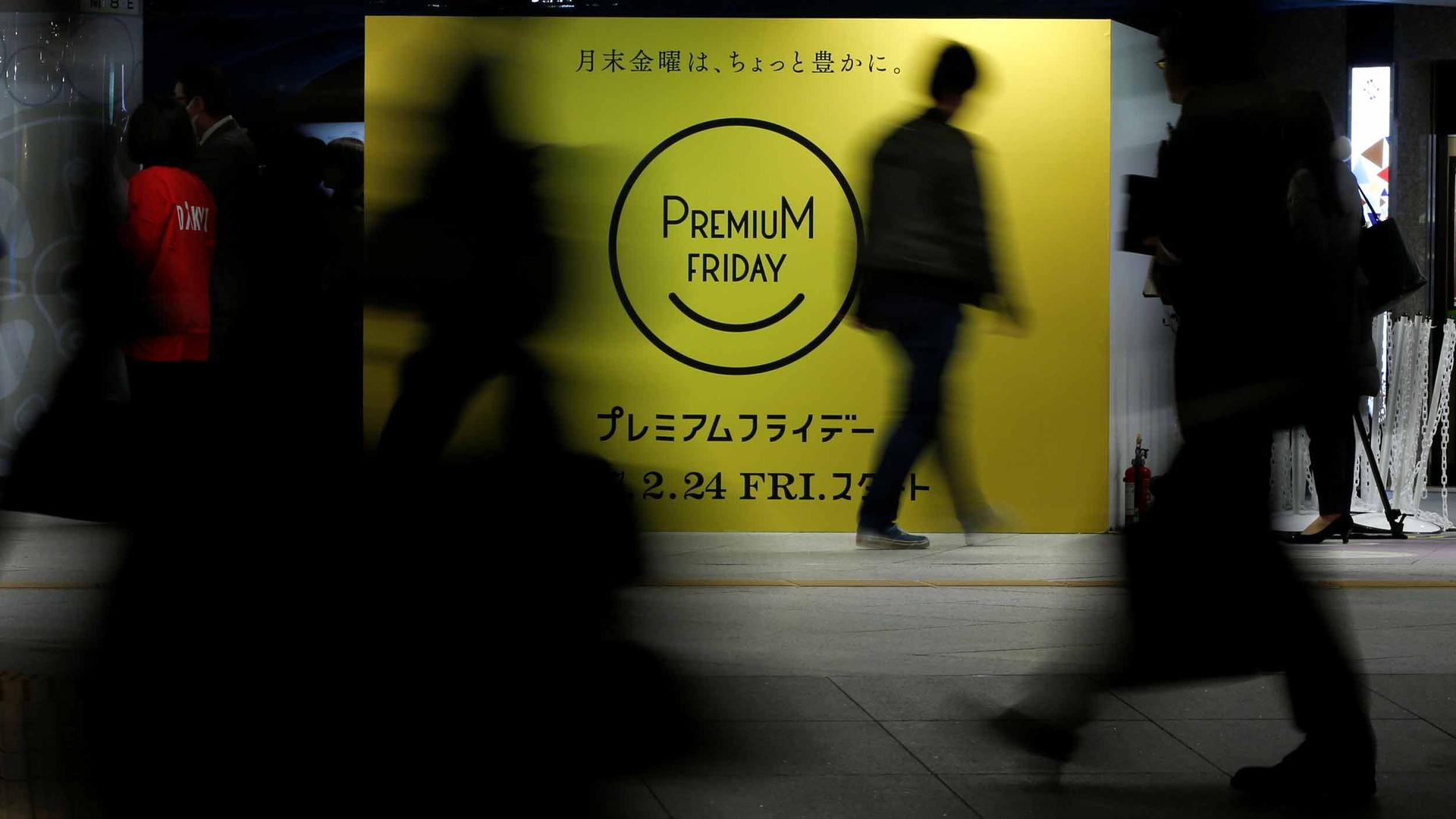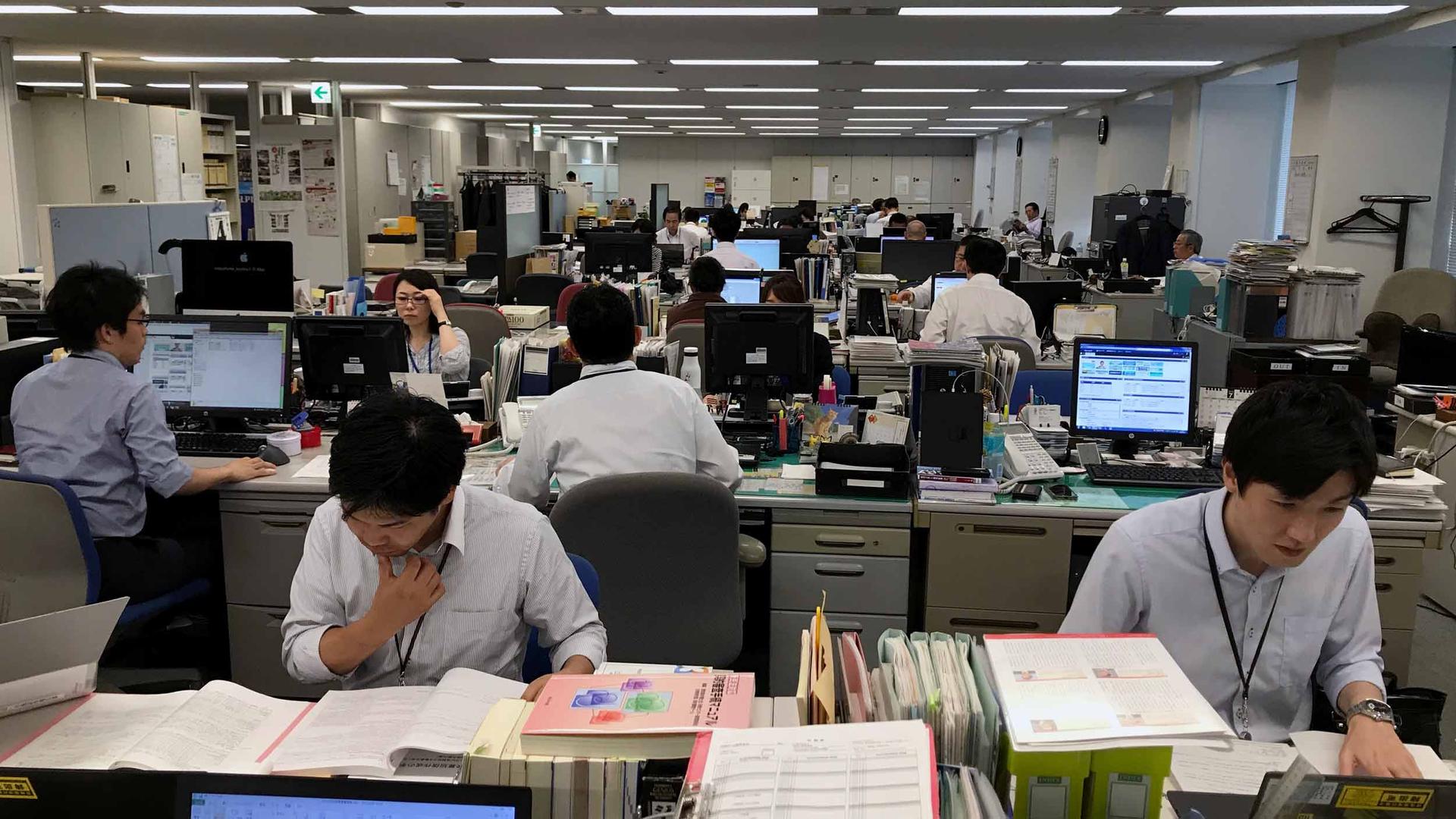Japan’s shrinking labor force is finding new ways to fight karōshi — ‘death by overwork’
Employees at Mitsui Home in Toyko work at their desks a few minutes before 6 p.m. At 6 sharp, the “Rocky” theme song will blare through loudspeakers, prompting everyone to stand up and tell their manager how much longer they intend to work.
Editor’s note: Scroll to the bottom of this story for warning signs and resources if you or someone you know may be considering suicide.
The theme song to the movie “Rocky” blares on the loudspeaker precisely at 6 p.m. every workday at the Tokyo offices of the construction company Mitsui Home.
Everyone in the office stands, and one by one the employees tell their manager what else they have to do for the day and when they’ll head home.
“I plan to go home after finishing the payment calculations,” a man declares, saying he’ll leave by 6:30.
“The Rocky music energizes people to finish up their work as soon as possible, and for those who need to have dinner with clients, it cheers them on for a successful evening,” says Naoaki Takane, a spokesperson for Mitsui Home.
Takane says this 6 p.m. ritual has increased efficiency and decreased overtime significantly.
“Without that, people would just continue to work on and on,” he says.
Related: In Japan, working mothers battle overwork culture
That tendency to overwork is in no way unique to the home construction industry in Japan. It’s such a problem that the Japanese even have a word for it: karō shi, which means “death from overwork.”
Stories of karōshi have made headlines in recent years. There was the young political reporter who suffered heart failure after working 159 hours of overtime and only getting two days off in a month. She was found dead in her bed, still holding her cellphone. There was the woman from an ad agency who jumped out of a window after tweeting, “I’m going to die. I’m so tired.” And then, the overworked maintenance employee who killed himself a year after his resignation was rejected.

“In Japan, people are working overtime because it’s just too much work for one person to handle,” says Yohei Tsunemi, a lecturer at Chiba University of Commerce.
He says Japan faces some serious problems. It has a declining population and a labor shortage. Tsunemi says companies need to consider whether more jobs can be automated.
“What needs to happen is that we have to cut down on the volume of work that needs to be tackled and also improve the employer-employee relationship,” he says.
Tsunemi says labor unions in Japan don’t have a lot of power, which makes it hard for workers to seek protections, and that includes for overwork.
Related: Japan aims to open door wider to blue-collar immigrant workers
Japan’s Ministry of Health, Labor and Welfare classify karōshi as the sudden death of an employee who works more than 80 to 100 hours of overtime a month. The most likely causes are heart attack, stroke or suicide. According to a government report, nearly a quarter of the companies surveyed had employees who worked those kinds of hours.
Yamato Nakamura used to be a middle manager at a gas company. He says his time card would automatically punch out at eight and a half hours a day.
“So I come into work and I’m supposed to leave at a certain time, but actually, I was working much more than that,” he says.
During the day Nakamura says he would inspect pipeline construction and at night, he’d process paperwork, not just his own, but his boss’s too. Nakamura says he became very depressed and couldn’t sleep.
“It got really serious,” he says. “I was getting medication for the depression, but I kept working. It got so bad that one day I jumped onto the railroad tracks. I just couldn’t control myself.”
Nakamura says he attempted to kill himself three times.
“But each time at the last minute my mother’s face popped in my head and I would start crying and couldn’t go through with it.”
Nakamura is 37 now and no longer works. The gas company fired him two years ago, he says because he was diagnosed with a mental disorder. He takes 15 pills a day to function and says he and his wife have decided not to have children because of his depression. For now, he volunteers with an association that supports the families of karōshi victims.
“I’m connected through Twitter with many who suffer a similar condition as me,” Nakamura says. “There are others who really have much more serious problems than I do, so I’m hoping to be able to hear their grievances, to be able to give them advice.”
Nakamura says he also hopes he can get better one day and return to work.
In 2017, the government released a list of hundreds of what it calls black companies which violate labor laws, in an effort to shame employers. But then last year, legislation was passed that caps overtime at 100 hours a month, even though the Labor Ministry has established that people who work that much are at risk of karōshi. Critics say this high cap could lead to more deaths from overwork.
“I’d like to see a law that protects the vulnerable,” Nakamura says.
[[entity_id:”181384″ entity_type:”node” entity_title:”Suicide Prevention Resources”]]
